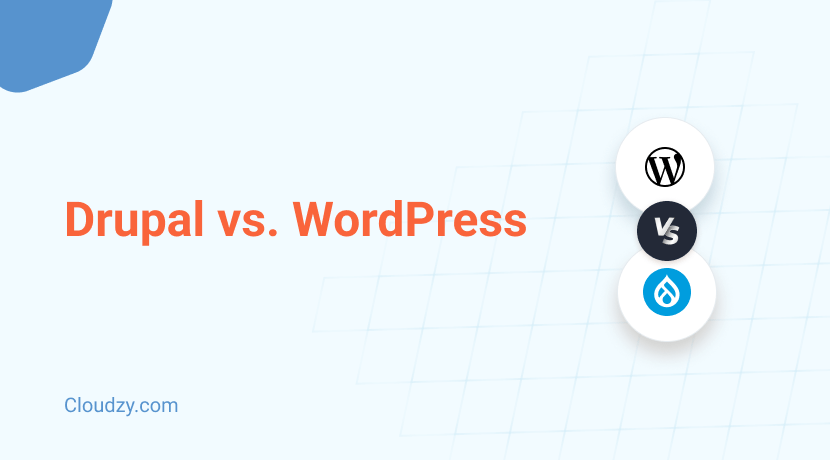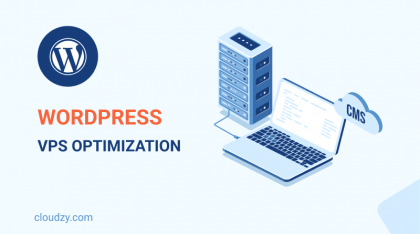One true fact? No website can function without a CMS. Content Management Systems are the core systems behind how any type of content is published and distributed around website pages. Now, we live in a digitalized world—hundreds of websites are created daily to represent businesses and companies, services, products, or even simply people. With this rise in online presence demand comes a high demand for content management systems.
This demand obviously means that there will be many CMSs for people and companies to choose from. The confusion about choosing the right CMS leads us to compare the most famous ones: Drupal vs. WordPress.
Both WordPress and Drupal are powerful content management systems, and both are very famous in the industry. The question is, which one is actually better for you? To answer this question, we are going to debate, head to head, on the Drupal vs. WordPress comparison and find out which one is best for what in terms of features and use cases.
WordPress — An Overview
First released in 2003, WordPress is an open-source content management system. The CMS was developed by Matt Mullenweg and Mike Little as a blogging platform. Since then, WordPress has evolved into what we today call an all-in-one content management system. According to a Demandsage analysis and statistics report, WordPress is the CMS used to power roughly 43.5% of all websites online in 2024. Its core strengths, features, and plugins have lured many users into using it, growing the target audience outside the circle of bloggers. Now, anyone can easily manage a website using WordPress.
One of the most important features that made WordPress a world-famous CMS is its easy-to-use interface. Because of its user-friendliness, WordPress grew popular among non-technical users, allowing them to create and manage websites without needing any coding knowledge. WordPress is also well-known for its ecosystem of themes and plugins. This ecosystem enables users the flexibility of adding any feature imaginable. Because of its open-source nature and popularity, WordPress is backed by a massive—probably the largest—community in the industry that includes extensive resources, forums, and support options. This huge community of resources adds value to WordPress’s accessibility, meaning that you can always find the answers you need about the CMS.
Drupal — An Overview
Drupal is known as a powerful and open-source CMS. It is developed by Dries Buytaert and first released in 2001. Drupal CMS is popular for its flexibility and powerful content management features. It’s really a suitable choice for managing complex websites, including those that require extreme customization, security, and scalability. While Drupal does not own the market share that WordPress does, a report shared by W3Techs shows that Drupal holds a rather interesting market positioning. As of November 2024, Drupal is mostly used by high-traffic websites.
If we take a quick look at Drupal’s core strengths, the advantages go beyond flexibility. Drupal CMS is highly customizable. The architecture behind Drupal is built to support any website structure. It is also well-suited for handling high-traffic sites, and it has been proven to work. The scalability and performance made Drupal CMS popular among government, enterprise, and educational institutions. Another reason these industries depend on Drupal for website content management? Drupal offers strong security features, making it a top choice for websites with high-security requirements. Another way Drupal shows flexibility is through offering advanced user management and permission settings. These settings make the CMS a powerful tool to manage multi-user websites that have specific access requirements.
Drupal vs. WordPress — A Feature Comparison
Now, we are talking about all these features—scalability, security, performance, and all. But let’s create a challenge and start our Drupal vs. WordPress comparison by comparing these core features they both seem to master:
1. Ease of Use
In the WordPress vs. Drupal comparison, we compare ease of use by looking into how the CMS interface, setup, and content management works. In this area, WordPress is a hard CMS to compare to. WordPress is known for being simple and accessible. It’s designed to enable users with little to no technical knowledge to use it with no difficulties. The interface is intuitive, with a simple dashboard that gathers main features, including managing posts, media, and settings in one place. The simplicity allows WordPress to be accessible for those who need a functional website ASAP without complex configurations.
Drupal, on the other hand, is designed for users who are more technical. So long as we are talking about basic functions and tasks, Drupal is easy to use. But once things start to get progressively more advanced, the difficulty of handling them using Drupal also gets higher. It requires a higher level of technical knowledge to set up and manage compared to WordPress. Drupal CMS developers have improved the interface over time, yet it’s still a bit more complex than WordPress. While the average user might struggle with managing Drupal, website developers and IT teams have no issues working with the CMS.
2. Customization
Customizability and flexibility in the WordPress vs. Drupal comparison can get quite competitive. When comparing the two, our initial thought is that WordPress is much more customizable and flexible. This is because of the themes and plugins. A large library of plugins and themes allows all users to add features like SEO, e-commerce, social media—possibly, anything. While WordPress is flexible for any type of website, its customizability relies mostly on the plugins, meaning that the CMS itself is not exactly customizable. This can cause limitation issues for more complex, highly structured websites.
When it comes to customizability, Drupal CMS is a natural. I have already mentioned that Drupal’s power lies in its high customizability options. Drupal allows users to create highly specialized content types. Define complex workflows, and develop custom modules. This level of flexibility is what makes Drupal the perfect CMS for complex websites. It’s also the same reason behind requiring deeper development knowledge.
3. Scalability
Scalability features matter when you’re dealing with a growing website. WordPress is a perfect option for small to medium-sized websites because it scales pretty effectively. Things can get complicated for larger websites as additional configuration and resources may be needed. High-traffic websites often rely on custom configurations, optimized hosting, or additional security measures to ensure stability. These all add complexity for large-scale implementations.
Drupal, however, is proven to work well with high-traffic websites. The reason is that the CMS is highly scalable and optimized for large or complex websites. The design behind Drupal CMS allows it to handle high traffic loads more efficiently than WordPress. This level of scalability makes up for WordPress’ additional configuration requirements for sites that anticipate significant growth or traffic spikes.
4. Performance
Performance-wise, WordPress can handle a variety of tasks efficiently. If multiple plugins or heavy themes are working, they can slow down its performance. If so happens, performance can be optimized by caching, using optimized themes, and working with high-performance hosting services. WordPress’s performance purely depends on how you optimize it.
Drupal is already optimized with performance in mind from the very first moment you start using it. This is another reason why Drupal CMS is a perfect option for high-traffic websites. Additional or custom optimizations are also available, and often required to ensure the best performance under heavy loads and traffic spikes.
5. SEO Capabilities
WordPress is great when it comes to SEO features because of the plugins it offers. SEO plugins like Yoast and All in One SEO help users optimize content for search engines. Features like customizable metadata fields, friendly URL structures, and the plugins can help create websites that are SEO-friendly, even for users with beginner search engine optimization knowledge.
Drupal offers robust SEO capabilities, but they might not be as strong as WordPress. It may need technical setup to fully leverage Drupal’s SEO features. You can use Modules like Yoast and Metatag to optimize metadata and manage URL structures. Drupal’s clean code structure is also SEO-friendly which allows strong visibility across search engines like Google.
6. Content Management
Content management and publishing are core features in the WordPress vs. Drupal comparison because that’s what these systems are built to do. WordPress was originally a blogging platform, so it’s safe to say that it offers strong content management features, including post scheduling, drafts, categories, tags, and many more. It also offers a media library that’s simple to navigate and allows users to effectively store and manage images, videos, and files.
Drupal doesn’t fail to please with its content management capabilities either. Drupal’s content management features are highly advanced in order to handle complex workflows, custom fields, and extensive categorization. Drupal is the right CMS for websites with multiple content types and roles and those with complex permission settings.
7. Cost-Effectiveness
We can’t really factor out costs and expenses from our WordPress vs. Drupal comparison, can we? So, let’s start talking money. While WordPress itself is a free tool, costs can be added up from hosting services, premium themes, plugins, and the maintenance needed to handle complex or high-traffic websites. Of course, these added expenses are not equal for all users and vary based on the scale and specific needs of different websites. What makes WordPress cost-effective is that these expenses are generally lower than those of competitive content management systems.
The same situation also applies to Drupal. The tool itself is free, and added expenses come from development and maintenance, especially when working with complex websites. Another factor that can increase expenses is that the technical expertise required usually creates the need to hire skilled developers. But while Drupal’s initial setup costs might be higher than WordPress, the scalability and long-term stability it brings to the table justify the initial investment.
8. Security
The last category we are covering in our Drupal vs. WordPress comparison is a critical one. The way these content management systems approach security determines their reliability with sensitive content. Security in WordPress is generally robust because of the regular updates. What raises a concern with WordPress is that it’s a common target for attackers. The solution is to choose third-party plugins and themes from reputable sources and always keep them updated.
Drupal handles security with a lot more consideration than WordPress. Since Drupal users are mostly governmental, financial, and other high-security websites, Drupal implements highly robust security measures in its framework. There is a dedicated security team behind Drupal that constantly vets core and contributed modules for vulnerabilities and releases security patches. Drupal’s high security standards and strict review process create a strong defense against potential cyber threats.
Drupal vs. WordPress — A Use Case Comparison
By now, you have a good idea of how suitable each CMS is for different types of websites. We know WordPress is generally used by most websites online and Drupal is ideal for high-traffic websites. In order to get a clearer picture, we’re going to continue our WordPress vs. Drupal comparison based on use cases and see how practical each CMS is in different industries.
Small Business Websites
WordPress: WordPress is a widely popular CMS among small businesses because of its user-friendliness, affordability, and the plugin ecosystem. These features allow small businesses to set up a website quickly, efficiently, and with minimum technical knowledge. The drag-and-drop page builders like Elementor allow easy customization to create appealing designs. WordPress is also a logical option for small businesses because many useful plugins are either free or very low-cost.
Best For: Small businesses that need a practical website with minimal setup or maintenance needs and expenses.
Drupal: Drupal’s flexibility and customization options make it a good fit for small businesses with specific content management requirements. It’s also a great option for small businesses that deal with sensitive data like customer information and require strict security measures. Drupal is a great tool to work with once you get a hold of it, but the learning curve might delay operations or you may need developer support for setup and maintenance. Drupal is not exactly an affordable option, but surely worth the investment. Once you’re passed the initial setup expenses, Drupal CMS is perfectly scalable to fit your website’s traffic growth.
Best For: Small businesses with complex content structures and custom features, as well as those that need higher security measures.
Large Enterprise Websites
WordPress: Although not exactly crafted to support large websites, WordPress can work ideally for managing enterprise-level websites with the right optimizations. If you use enterprise-grade hosting services, catching, and security solutions, you can efficiently use WordPress to manage your website’s content. The plugin ecosystem is a great environment to find and enable the integrations you need for your enterprise website, including CRM or analytics tools. The highest concern enterprise companies have about using WordPress is that it can be secure, but it may require investment in managed security services to ensure a higher level of protection.
Best For: Enterprise websites with regular content updates and teams who need user-friendly interfaces.
Drupal: Drupal is the perfect fit for enterprise websites because of its robust security options, scalability, and its high level of customization services. Drupal is known for performing well under high traffic loads, making it suitable as an enterprise-level CMS. Not only that, but Drupal offers advanced content management and workflow capabilities that are exactly what companies with complex websites need.
Best For: Large websites with specific customization requirements. Also, for high-traffic websites and those that have strict security requirements.
E-commerce Websites
WordPress: WordPress is one of the most used content management systems in the e-commerce industry because of the plugins. The WooCommerce plugin is a straightforward way to set up an e-commerce website without needing any technical knowledge. WordPress also offers a wide range of plugins for payment gateways, shipping, and tax management. WordPress is perfect for small and medium-sized online stores, but if you are expanding to a larger catalog, you may need additional optimization and hosting services to maintain speed and performance.
Best For: Small and medium-sized e-commerce stores that need a user-friendly setup and quick deployment.
Drupal: Drupal Commerce is specifically designed for online stores of any size. It is highly customizable to answer complex e-commerce requirements like custom checkout flows or multi-store capabilities. Its high scalability makes Drupal Commerce a great option for growing and larger stores with high traffic or complex products and pricing structures. Again, it requires more technical setup or developer support, so if you have an expert IT team or the technical knowledge to work with Drupal Commerce, you’re good to go.
Best For: Large e-commerce websites with complex requirements like high customization, scalability, and advanced product management.
Content-Heavy Websites
WordPress: Content-heavy websites like news or blog sites require a content management system that’s specifically designed to manage content with high flexibility and performance—WordPress does just that. Developed as a blogging platform, WordPress is a natural fit for content-heavy websites because of its extensive content management features. Again taking advantage of the plugins, WordPress offers SEO plugins, scheduling, editorial tools, and media handling features that make content management smooth and easy for blogs or news websites.
Best For: Blogs, news websites, and other content-heavy websites with normal daily traffic. Also a suitable option for content-heavy websites that require frequent updates and multimedia content support.
Drupal: Comparing Drupal vs. WordPress on content-heavy websites feels like a waste of time since WordPress literally dominates the industry. But if we go back to WordPress’s limitations with high-traffic websites, Drupal gets a chance. Drupal is an ideal CMS for large content-heavy websites—any that requires advanced categorization and complex content structures. It helps create smooth content workflows that makes large volumes of different content types much easier. Drupal’s scalability helps with large content-heavy websites as well by being flexible toward heavy traffic.
Best For: Larger content-heavy websites with complex content requirements, many contributors, customization needs, and scalability requirements.
In the end, the conclusion to our Drupal vs. WordPress comparison is not to say which one is better than the other—it’s more a matter of how suitable each is for what use. To get a clearer perspective on that, let’s have an overview of our Drupal vs. WordPress comparison:
| Use Cases | Best for WordPress | Best for Drupal |
| Small Business Websites | Simple websites with minimum customization | Growing small websites with complex content structures |
| Large Enterprise Websites | User-friendly website with plugin integrations | High-traffic websites with custom needs |
| E-commerce Websites | Small to medium-sized stores | Large catalogs with multi-store capabilities |
| Content-Heavy Websites | Blogs and news websites needing regular updates | High-traffic websites with complex content structures |
Content Management Systems and Hosting Services
By now, I think I have mentioned “hosting services” quite a few times when comparing Drupal vs. WordPress. Managing a website requires more than the CMS itself; you need an environment to host your website. For WordPress or Drupal to work effectively and with the highest performance, you need a robust and reliable hosting service—meaning that shared hosting services are just out of the question.
Virtual Private Servers (VPS) make great hosting environments. Cloud-based virtual servers are even better options if you value flexibility and scalability. Virtual servers are affordable, private and secure, and they give you the resources you need.
Cloudzy is a VPS provider that aims to provide the right hosting services to all clients. But we don’t just offer virtual private servers. What if I told you that you can work with Drupal without the initial headache of setting it up?
If you want to use a CMS on a VPS, you need to install, configure, and optimize it so that it runs smoothly. At Cloudzy, we have taken a step further and offer both WordPress and Drupal as one-click apps. This means that You can get a WordPress VPS or a Drupal VPS with just one click and have a robust virtual private server delivered in more than 15 global locations and with WordPress or Drupal already installed—all you have to do is to optimize the CMS further to meet your website’s requirements. Other features you can take advantage of are a high uptime guarantee of 99.95%, a stable 10Gbps network connection, high bandwidth, and the latest hardware resources to back up quality and performance.
Drupal vs. WordPress — A Wrap Up
This Drupal vs. WordPress comparison aimed to introduce you to each CMS and how they function. You now know how WordPress and Drupal work, what their core strengths are, and how they perform well compared to each other in different industries.
I cannot advise you to pick one; the decision is yours and depends on what your business needs. Need a beginner-friendly CMS to run different types of content on your website? Go for WordPress. Got a complex website and need a high-security management system? Pick Drupal.
Whichever you choose, you don’t have to worry about the setup. At Cloudzy, we offer a robust hosting environment for your WordPress or Drupal website without the complex and time-consuming initial setup.
Get yourself a WordPress or Drupal one-click app VPS and start hosting and managing your website as soon as your VPS arrives!
 Start Blogging
Start Blogging
Self-host your WordPress on top-tier hardware, featuring NVMe storage and minimal latency around the world — choose your favorite distro.
Get WordPress VPSFAQ
Is WordPress Better than Drupal?
This is a subjective matter. WordPress is used by most websites and Drupal is a powerful CMS. You can never decide on which one is better than the other, but you can compare them based on their features and use cases.
What are some Drupal alternatives?
There are some content management systems that are powerful enough to be considered as Drupal alternatives. Some of the best ones include Contentful, Kentico, Sitecore XM, Joomla, and of course WordPress.
Can WordPress perform as well as Drupal in high traffic times?
WordPress has limitations when it comes to growing traffic. But if optimized correctly, it can handle traffic spikes. Overall, optimizing WordPress to perform smoothly during high traffic periods is both complex and risky. If you work with a high-traffic website, consider using Drupal.






2 thoughts on “Drupal vs. WordPress – Which CMS Platform Is Better for You?”
I was suggested this blog by means of my cousin. I am
not sure whether or not this submit is written through him as no one
else understand such unique about my difficulty. You’re wonderful!
Thanks!
When I initially commented I clicked the
“Notify me when new comments are added” checkbox and now each time a comment
is added I get four emails with the same comment.
Is there any way you can remove me from that service?
Thanks!